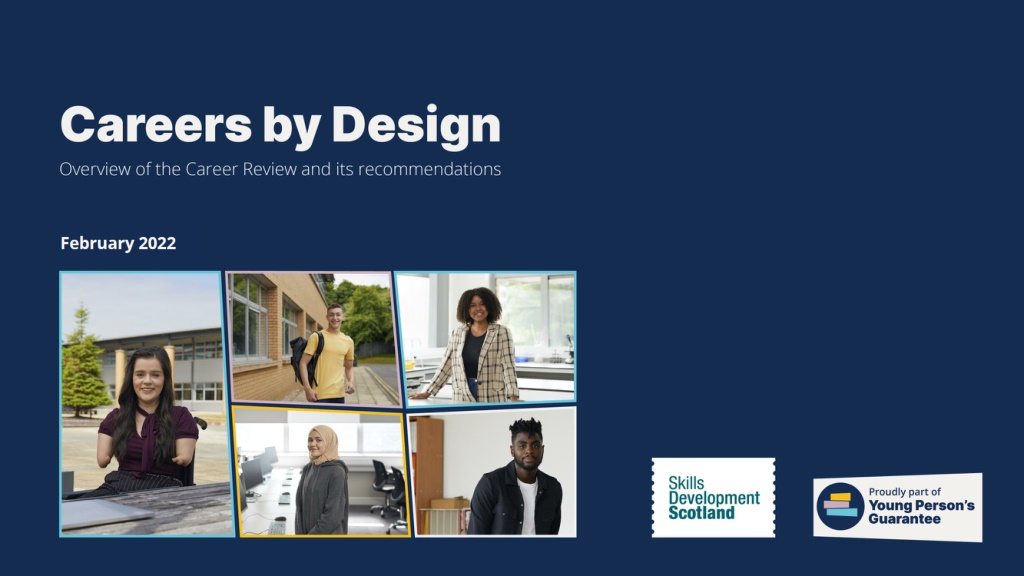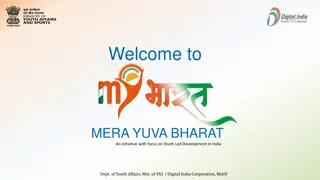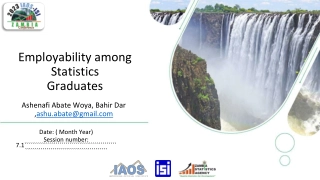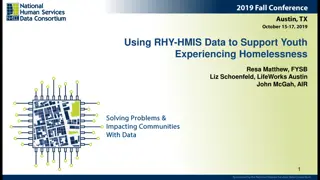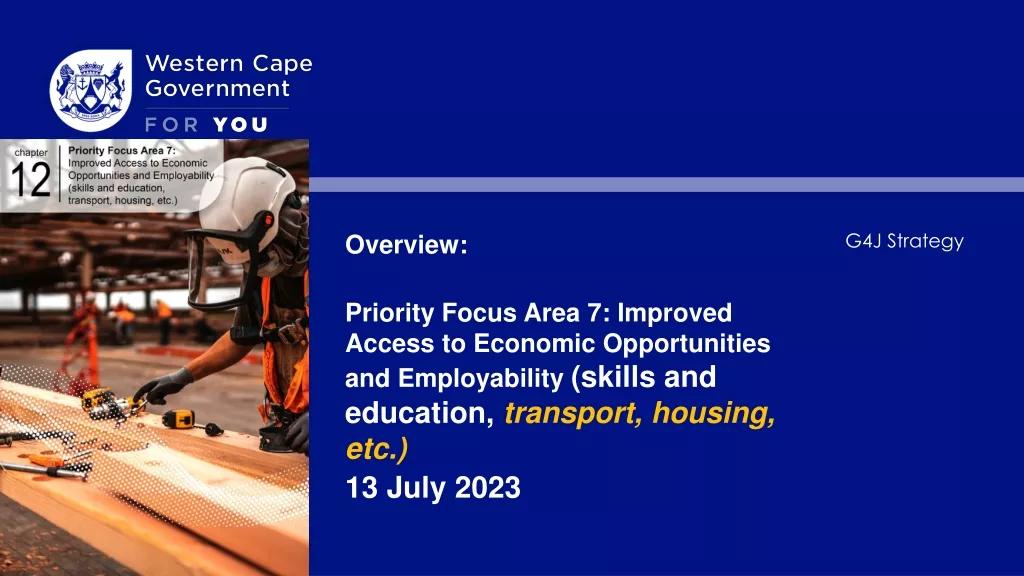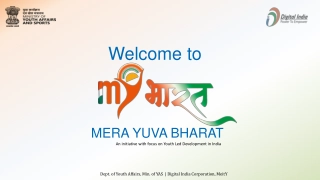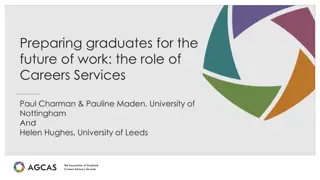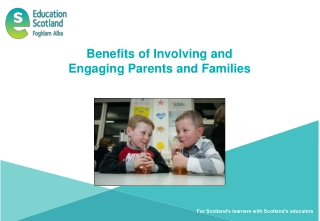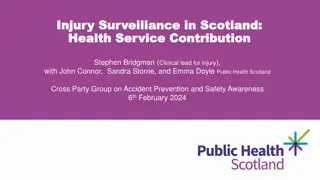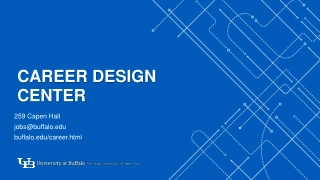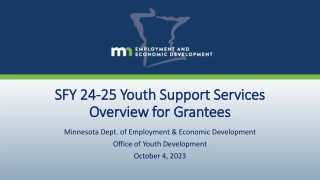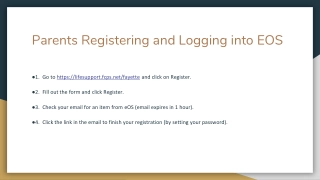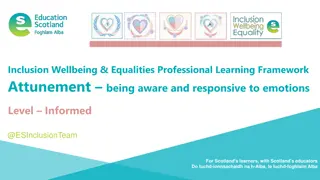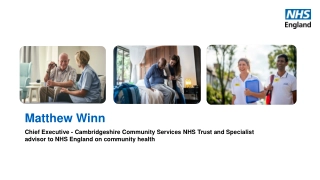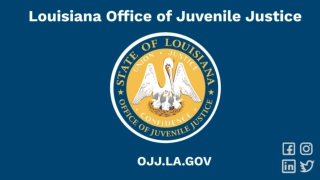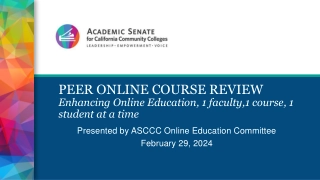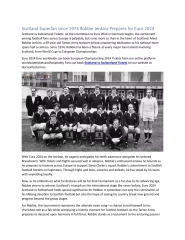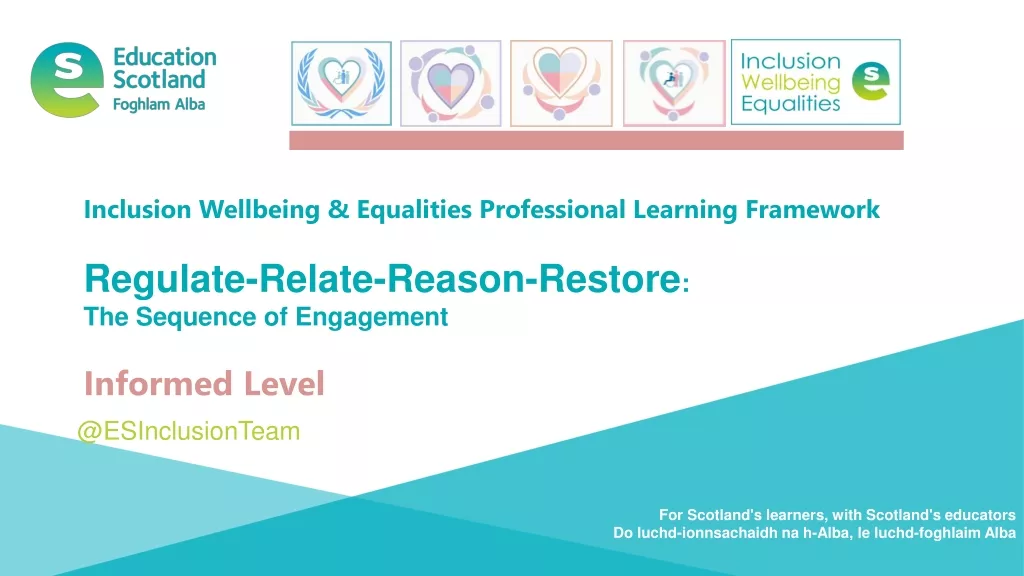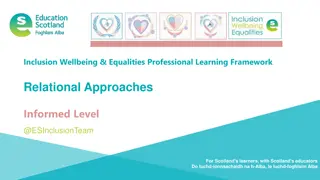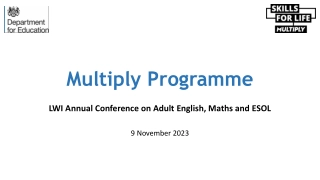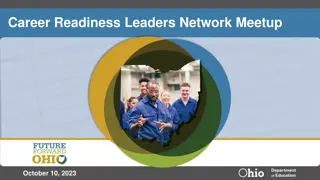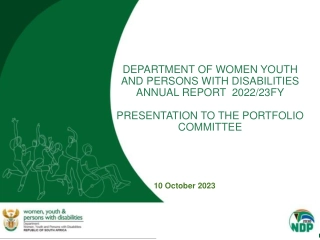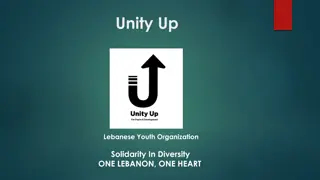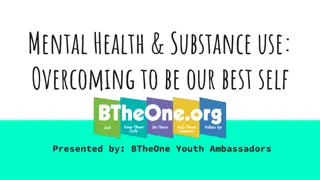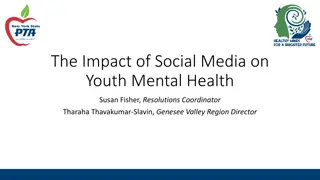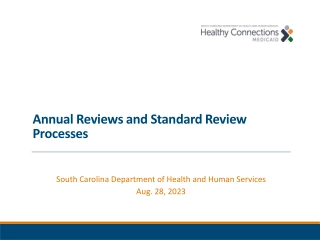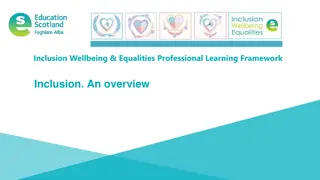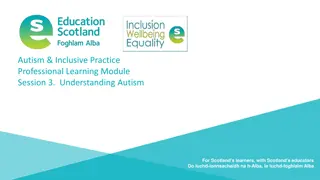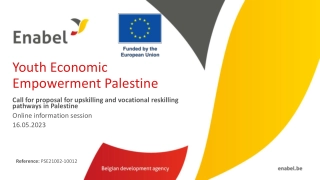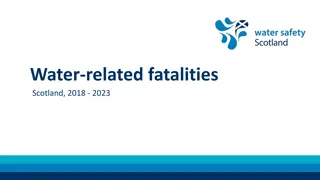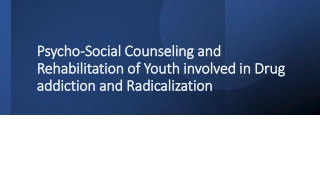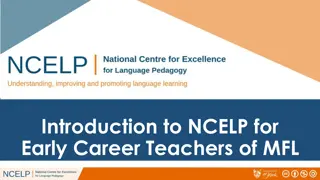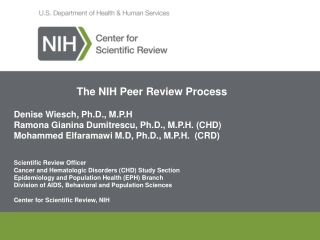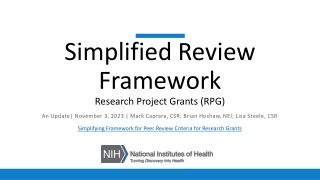Career Services Review in Scotland: Enhancing CIAG for Youth Employability
Scotland's Career Strategy and Sandy Begbie's Youth Guarantee report highlight the importance of reviewing career services to maximize impact and engage with the third sector. The career ecosystem in Scotland involves various organizations and institutions investing in career-related services for over 1.2 million young people. The review aims to ensure accessible, personalized, and joined-up career information, advice, guidance, education, and brokerage services to address the evolving labor market challenges amid global drivers of change like the climate emergency and COVID-19.
Career Services Review in Scotland: Enhancing CIAG for Youth Employability
PowerPoint presentation about 'Career Services Review in Scotland: Enhancing CIAG for Youth Employability'. This presentation describes the topic on Scotland's Career Strategy and Sandy Begbie's Youth Guarantee report highlight the importance of reviewing career services to maximize impact and engage with the third sector. The career ecosystem in Scotland involves various organizations and institutions investing in career-related services for over 1.2 million young people. The review aims to ensure accessible, personalized, and joined-up career information, advice, guidance, education, and brokerage services to address the evolving labor market challenges amid global drivers of change like the climate emergency and COVID-19.. Download this presentation absolutely free.
Presentation Transcript
About the review Scottish Government published Scotland s Career Strategy, Moving Forward Feb 2020 Strategy recognises rapidly changing labour market and need to ensure CIAG is more obvious, accessible, personalised and joined up Scottish Government published Sandy Begbie s Initial Report: Youth Guarantee No-one Left Behind Sept 2020 Identifies wide ranging resource devoted to career services and employability support highlights importance of maximising impact Recommends review of career services, highlighting importance of engaging with the third sector Independent Programme Board, chaired by Grahame Smith, established to oversee SDS s work to undertake review Dec 2020
Defining career services Career Information: providing career and labour market information about further and higher education, career assessments and tests Career Advice: employment, job search and career advice (can be provided by someone other than a qualified careers professional) Career Guidance: career counselling / one to one career guidance (cannot be provided by anyone other than a qualified careers professional) Career Education: delivering career education as part of the curriculum either as a discrete subject or embedded in wider subject provision. Such learning can be both classroom-based and experiential Brokerage: career learning by organising encounters with employers, trade unions and others (e.g. talks, career fairs, mentoring, work experience, volunteering and helping young people develop an understanding of fair work and work-related rights and responsibilities).
The career ecosystem in Scotland Career services are provided by a wide range of organisations and institutions The following were in scope for the review: Skills Development Scotland Developing the Young Workforce Schools Colleges Universities Our research indicates the organisations in scope: invest between 159m 216m in career services each year have over 1,700 career related staff (1.2 million young people between ages of 5-25) career-related specialisms and qualifications are high in SDS and universities and low (but variable) within DYW and colleges
Context: drivers of change The climate emergency COVID-19 Industry 4.0 & disruptive technologies A dynamic labour market Stretched public finances Poverty and inequality Education reform The changing nature of work
Review approach Recommendations represent transformational and deliverable redesign of career system The most comprehensive review of Scotland s career services in a generation Leadership provided by independent Programme Board with representatives from all parts of the career system, chaired by Grahame Smith Critical dependencies on and alignment to ongoing interventions in education, economy and society Burning need and opportunity to act quickly to maximise recovery and minimise scarring impact of pandemic Evidence-led, driven by insight and co-design Equity at the core of the approach: each recommendation seeks to address inequality, informed by a comprehensive Career Review Equality Impact Assessment Remit focused on young people however in line with the all-age approach outlined in career strategy
Customer centred, evidence led Over 250 customer interactions via: Co-design labs Engagement sessions In-depth workshops 1-2-1 engagements representing the range of service areas and protected characteristics
Services in the ecosystem are working Internationally recognised Scotland has protected funding for services that are envy of many other countries Prioritised within policy Career services are central to Scottish Government policy In demand and valued Young people value career services - demand is high and growing High quality national career service Over 75% of SDS services are independently assessed as very good or excellent by Education Scotland Professional workforce in schools and university In-person career services are delivered by highly qualified practitioners in schools and universities Growing partnerships between education and employment The DYW infrastructure has started to bridge the gap between employers and education Local structures, inc third sector, are effective at connecting people to services Local Employability Partnerships and other local structures are key to joining up delivery on the ground and making sense of competing policies and priorities
but not for everyone Career education is not embedded or prioritised in curricula systematically Insufficient resource to provide personalised 1-2-1 support to every young person Fragmented and complex delivery landscape Limited oversight of the ecosystem Demand often goes unmet and is likely to increase Not all young people have equal access Limited professional guidance resource in colleges Pressure on finances and initiative overload Largely measured on activity not outcomes Inequality and discrimination continue to damage the life chances of many young people
How we can improve: design principles The Service 1. Career services meet the dynamic aspirations and different needs of all young people 3. Career services enable young people to expand their knowledge and experience of Fair Work 2. Career services build agency and equip young people with the skills to thrive in a changing world The Curriculum 4. Career experiences are integrated into curricula, practice and culture of the education system The Ecosystem 5. An eco-system of assets delivering coherent and impactful career services for Scotland
Our recommendations 6. Exposure to fair work People should have a right to have a wide range of meaningful opportunities to experience work and understand what fair work is. 1. A new career development model A simple model should be established that defines career services, bringing definition to the variety of career services across Scotland. 7. Digital enablement, empowerment & engagement Enhanced digital services and online tools should be developed that present information about the world of work in an inspiring and accurate way. 2. Developing skills and habits essential for the future world of work Career education and services should be designed to develop, recognise and accredit the skills and habits essential for the future world of work. 8. Clear roles for the delivery of career services Where appropriate, the roles across career services should be defined, to deliver the career development model in a coherent way. 3. Creating person centred career services Individuals should be involved in identifying what they need from career services based on their own circumstances and context, which leads to a flexible and personalised service offer. 9. Strengthening evaluation and continuous improvement The effectiveness and impact of the whole career system should be measured using a suite of outcome-based measures that are integrated in all settings, supporting the delivery of responsive and flexible services. 4. Experiential career education There should be dedicated curriculum time for experiential work- related learning in all settings. 5. Community based services Young people have a right to have to a wide range of opportunities, to experience the workplace and understand what fair work is. 10. Creating a career services coalition A coalition should be established that ensures the implementation of the Review s recommendations and the coherence of career services across Scotland, where young people, practitioners, employers and stakeholders are represented.
A new career development model A simple model should be established that defines career services, bringing definition to the variety of career services across Scotland. The change The outcome I know what learning experiences I can expect to take part in to help me make decisions about my career. A new career development model that provides a national delivery framework for any organisation supporting career choices. Its adoption drives coherence and consistency in the delivery of career services and ensures improved outcomes. It helps clarify roles and responsibilities across the ecosystem and The equity impact ensures that reflection on career experiences is fundamental to the The model recognises each person as an individual with their own distinct needs. It offers meaningful and accessible support in career development, tailored to them when they need it. individual s progress It supports equity of access in any setting meaning everyone experiences a similar standard of service irrespective of who is offering it. 15
A new career development model A simple model should be established that defines career services, bringing definition to the variety of career services across Scotland. This DRAFT model defines what career services need to do. It simplifies and brings definition to the disparate set of services that exist today. The evidence tells us that customers are most likely to benefit from at least one of the aspects of the service we have set out. The model is described in an active way - its success for the individual is dependent on services providing experiences. Actions can be carried out at different levels depending on age and stage. We will continue to develop and co-design this model through the next phase of the review. 16
Developing skills and habits essential for the future world of work Career education and services should be designed to develop, recognise and accredit the skills and habits essential for the future world of work. The change The outcome I can describe, and I am developing, a set of skills for the world of work and that will help me manage my career. Career education and services which develop, recognise and accredit the skills and habits that help people make informed choices, adapt and respond to the changing labour market. The equity impact Skills are given currency, and the development of the skills to manage a career and thrive in the world of work are a cornerstone of all learning, Collaborating with individuals throughout their own unique journey will offer diverse and equitable experiences, enabling the development of skills and career habits that help them thrive in the future. education and employment related support. 17
Creating person centred career services Individuals should be involved in identifying what they need from career services based on their own circumstances and context, which leads to a flexible and personalised service offer. The change A shift from a needs based approach to a universal and lifelong asset based approach, focused on strengths, building agency, resilience and flexibility Young people s voices are fundamentalto all future career service development and delivery Services are more relevant, impactful and universally accessed. Services and practitioners have space to explore changing need on an ongoing basis through professional practice Data sharing is enhanced in line with relevant legislation and regulations with information being shared between professionals at appropriate and relevant stages of transitions The outcome I know that career services understand me, that they are there when I need them, and will help me get to where I want to be. The equity impact Encouraging the exploration of each person s life, interests, morals, skills and values, building a narrative of their own story, deepening self-worth and belief in their contribution to the world. 18
Experiential career education There should be dedicated curriculum time for experiential work-related learning in all settings. The change The outcome In my learning I know there will be a range of meaningful activities that are hands on and help me understand and experience fair work. Experiential work-related learning is part of the fabric of curriculumdesign and delivery in primary, secondary, college and university Those delivering the curriculum are supported to make connections to the world of work The equity impact Elements of the curriculum are delivered in the practical setting of the workplace Each individual is entitled to access fair, just and purposeful work-related learning embedded within their curriculum that aligns with their goals and ambitions. All learning incorporates equality and diversity principles that challenge and overcome entrenched ideas about the world of work, such as gender stereotypes. Young people understand the practical value of what they are learning and how this learning can be applied in the world of work 19
Community based services Career services should be delivered within communities in a way that is aligned to social justice values and provides access to consistent national services. The change The outcome I know that within my community there are people who I trust to help me explore careers and I have access to the same chances as everyone else. Services are available within and through the communities with which young people identify and those involved in delivery are trusted by their community Services are accessible and approachable and able to relate to the situation and needs of those who may otherwise be disengaged Services are designed and delivered to meet the needs of those with lived The equity impact experience of protected characteristics and other equality factors All communities, their needs and values are appreciated, understood and accepted, so there will be fair and equitable career services. Local Employability Partnerships ensure that services are integrated, and investment meets the needs of individuals and the economy Formal career services work in strong collaboration with LEPs to deliver, leading to an improved learner journey 20
Exposure to fair work People should have a right to have a wide range of meaningful opportunities to experience work and understand what fair work is. The change The outcome I know I ll get lots of chances to explore jobs and work in different ways. Young people understand their entitlement to work experiences at different stages of their learning journey Work experiences incorporate a wide range of offers, e.g. job shadowing, mentoring, employer / sector tasters, projects, challenges and other experiences A systematic approach is taken to shape services against these entitlements The equity impact Entitlements are captured in a framework, which defines outcomes, roles and Every person is entitled to accessible and inclusive work-related experiences embedded within the curriculum that incorporates equality and diversity and aligns with their goals and ambitions. responsibilities Education and career service providers understand employer needs and how to engage effectively to overcome barriers to participation Young people understand fair work practices and 21 their expectations of employers
Digital enablement, empowerment and engagement Enhanced digital services and online tools should be developed that present information about the world of work in an inspiring and accurate way. The outcome The change I find digital information and activities more A wide range of innovative digital tools provide immersive and engaging career inspiring, current, relevant and self experiences and services aligned to the Career Development Model. explanatory. Digital technology connects people to the right support at the right time, in ways which are highly personalised, relevant and engage local communities. The equity impact Digital services are easy to access and seamlessly integrated with face-to-face delivery. Through the development of inclusive, They provide the highest levels of trust and allow people to own their data. accessible digital services and tools all people Public investment in digital technology is systemic, fully realised and has no can access inspiring, trusted and relevant duplication. content. This is complemented with access to professionally qualified, impartial 1:1 support to 22 use, navigate, and process information..
Clear roles for the delivery of career services Where appropriate, the roles across career services should be defined, to deliver the career development model in a coherent way. The outcome The change I am supported by a group of people who know me and help me achieve my potential. Young people know who can help, accessing the right support at the right time. A common approach to career services aligned to the CDM A system wide Target Operating Model ensures integration no-one falls through the cracks The roles that deliver the CDM are clearly defined and articulated. The equity impact Practitioners are connected. There is a long term, collaborative approach to The career ecosystem will inclusively offer accessible and dependable support throughout an individuals diverse life experiences. practitioner professional development and qualifications (where relevant). Employers, trade unions and representative bodies find it easier to engage with the education system and career services. Parents and carers are supported in their key role as influencers. 23
Strengthening evaluation and continuous improvement The effectiveness and impact of the whole career system should be measured using a suite of outcome-based measures that are integrated in all settings, supporting the delivery of responsive and flexible services. The change The outcome My growth/progress and level of satisfaction is measured to improve career services. We understand the difference that enhanced career services are making We measure outcomes and monitor uptake of entitlements Clear key performance indicators help organisations manage their performance, allowing services to be refined and improved and evidencing return on investment The equity impact A systematic quality assurance process ensures services are of consistently high quality The approach places importance on identifying outcomes that reflect individual goals, distance travelled and career happiness, and evaluate the quality and effectiveness of the career ecosystem for all individuals and its impact on wider economic and social objectives. Ongoing evaluation leads quickly and directly to changes at a national and local level meaning services are always improving and kept up to date with changes in industry. We understand the impact career services have on 24 wider economic and social objectives
Creating a career services coalition A coalition should be established that ensures the implementation of the Review s recommendations and the coherence of career services across Scotland, where young people, practitioners, employers and stakeholders are represented. The change A coalition of delivery organisations, service users, practitioners and The outcome I have a say in how services are developed and delivered in a way that benefits me. employers take forward the recommendations in a collaborative way. The coalition ensures the recommendations are delivered and implementation is co-designed with users and stakeholders. The coalition is led and supported by Scotland s national skills agency, with The equity impact collective ownership and accountability across members for implementation, change management and continuous improvement. The coalition ensures that equality, diversity and inclusion are at the forefront of career services, informed and represented by individuals with lived experience of all protected characteristics, key organisations and inclusive, fair work employers and trade unions. Young people and other stakeholders are involved in decision making and continue to shape future services. The careers and teaching workforce and the trade unions that represent them are valued and engaged in the change process and 25 in continuing to shape future services.
Dependencies The review of Curriculum for Excellence and the SFC Review of coherence and sustainability Development of the National Strategy for Economic Transformation Policy integration Skills alignment The role of employers and business support Clear leadership, empowerment and accountability to deliver the change required A move to multi-year funding assumptions 26
Next steps The Programme Board will work with practitioners, stakeholders, career influencers and those with lived experience to co-design and co-develop: The future state target operating model and service blueprint A detailed implementation plan The career development model The remit, functions and composition of the proposed career services coalition inc understanding international and national structures and developing options for Scotland A programme of further testing with all-age users Engagement with wider policy developments aligned to the implementation plan to ensure integration 27
